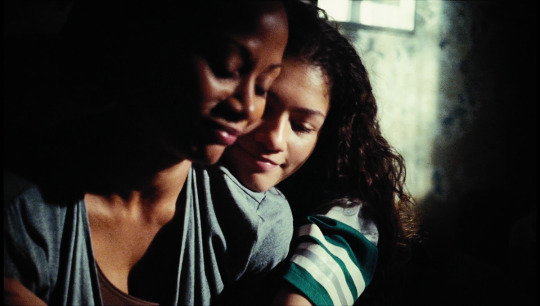
“Stand Still Like a Hummingbird” was the most recent episode of Euphoria where actress Zendaya powerful performance illustrated the realities of drug addiction and the ripple effect it has on your loved ones. In the beginning scene is Zendaya’s character Rue is spiraling from withdrawal and begins to have a panic attack as she realizes her mother, who is confronting her about her drug use, has flushed the suitcase of drugs Rue was supposed to sell. This scene was heartbreaking to watch, as Rue’s drug addiction propels her abusive lash-out to her mother Leslie and younger sister Gia. There are moments where Rue comes close to physically abusing her mother, yet Leslie stands her ground and is shown stating ” I raised you, I did. Ok?” but Leslie eventually goes to Gia’s bed to protect her as she realizes the increasing violent nature of Rue. Throughout the whole episode as Leslie attempts to take Rue to the hospital and rehab, I see a Black mother who stands in resilience even when so physically and emotionally soaked up in despair.
Tweets over the course of the second season have joked about how Leslie is not the traditional black mother because she is not up in Rue’s business and in moments of anticipation of Rue’s outburst scenes, some viewers joked of anticipating for a moment where Leslie would snap and bring out the belt for Rue. While of course these are jokes, I understand that they hold some truths as Leslie is not like many traditional black mothers we see on screen. I feel watching Nika King portray Leslie was the something that brought me a sense of peace, not that I am banking on her being the key to Rue’s sobriety. However, her parenting especially in this scene was like watching an informational video about how generational trauma can cease.
In The Hollywood Reporter asked King on how she got into the right mindset to play a mother who is grappling with hopelessness and guilt over her drug addicted daughter. King responds
“I went to my mom, even though my mom has never experienced this — she has six kids, none of us are addicted to drugs. But, she had her own battles. So I was able to communicate with her about different behaviors, like how addicts think, how they act, how they talk, how they behave when they want to get that hit…..As an actor, you have to replace the characters you’re in a scene with with someone in your life. So, for me, a lot of the times Rue was little Nika. And so throughout this whole process, it really has been a healing journey for myself, as well. ” (The Hollywood Reporter)
King explains how reflecting on her upbringing as well as centering to the behaviorisms of addicts created Leslie and a the most beautiful part is hearing how King was able to heal from this process. As we as viewers especially, black viewers see Lesliee while she is definitely struggling, she is also present. Actively straying from blocks of miscommunication within a parent to child dynamic is a matter that so many of us are commonly faced with. Moreover, I love how Euphoria introduces a new type of black mother and daughter relationship. Black women have experienced the memorable duo of Nikki and Kim, or Lisa Landry with Tia and Tamera, and while I love these mother and daughter relationships on screen, I can also salute Leslie Bennett as her strivings and patience create a bridge for Rue.
